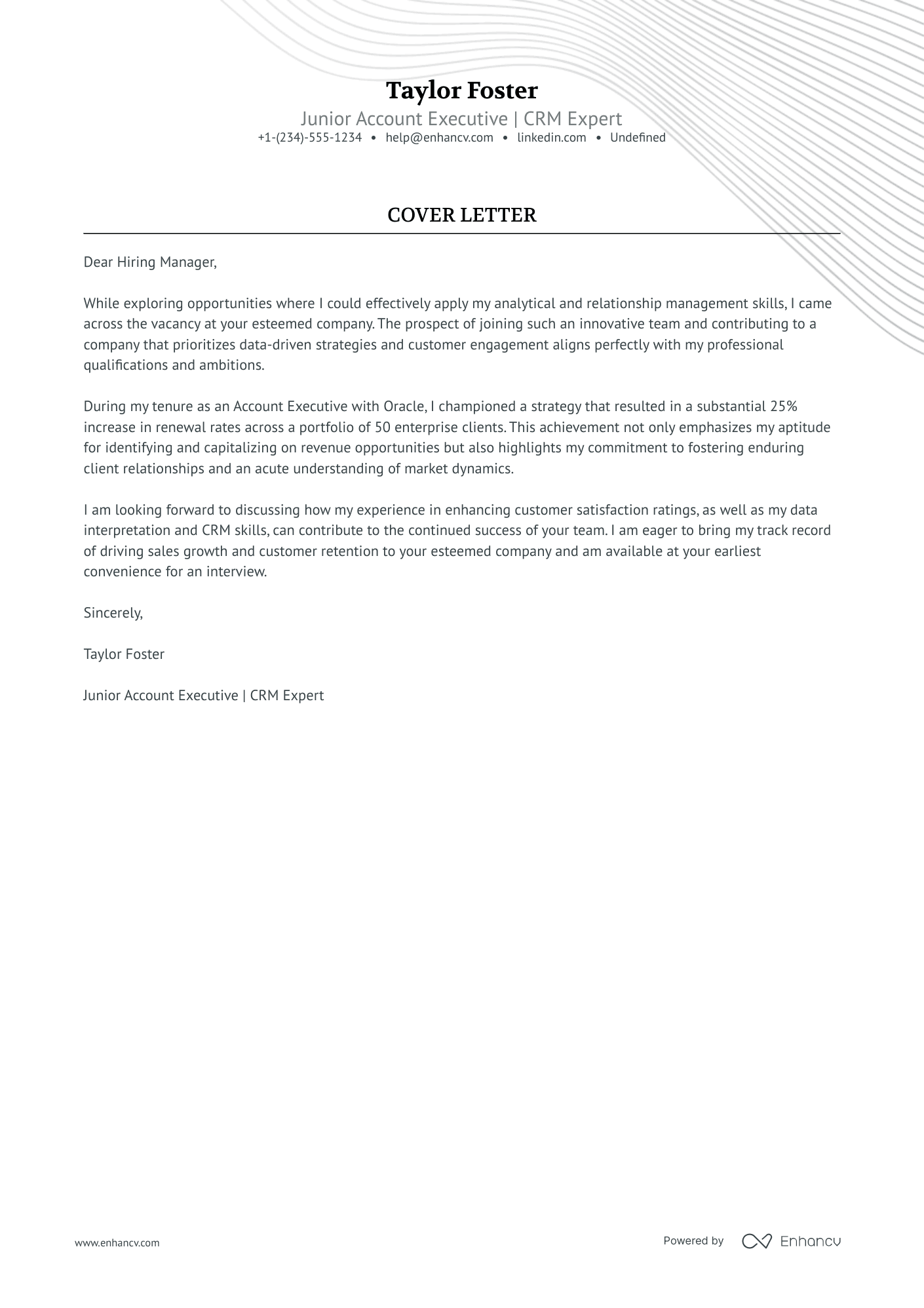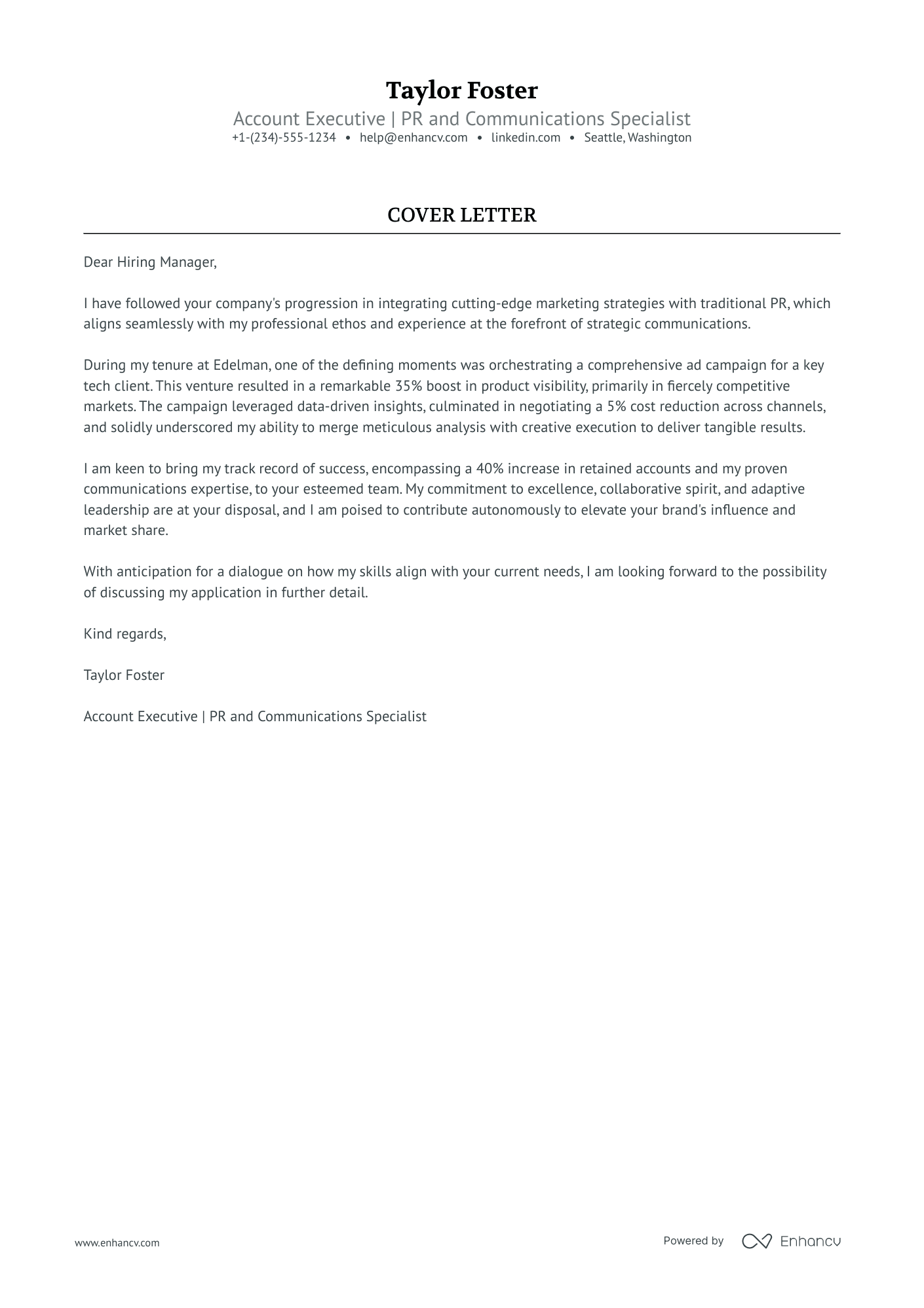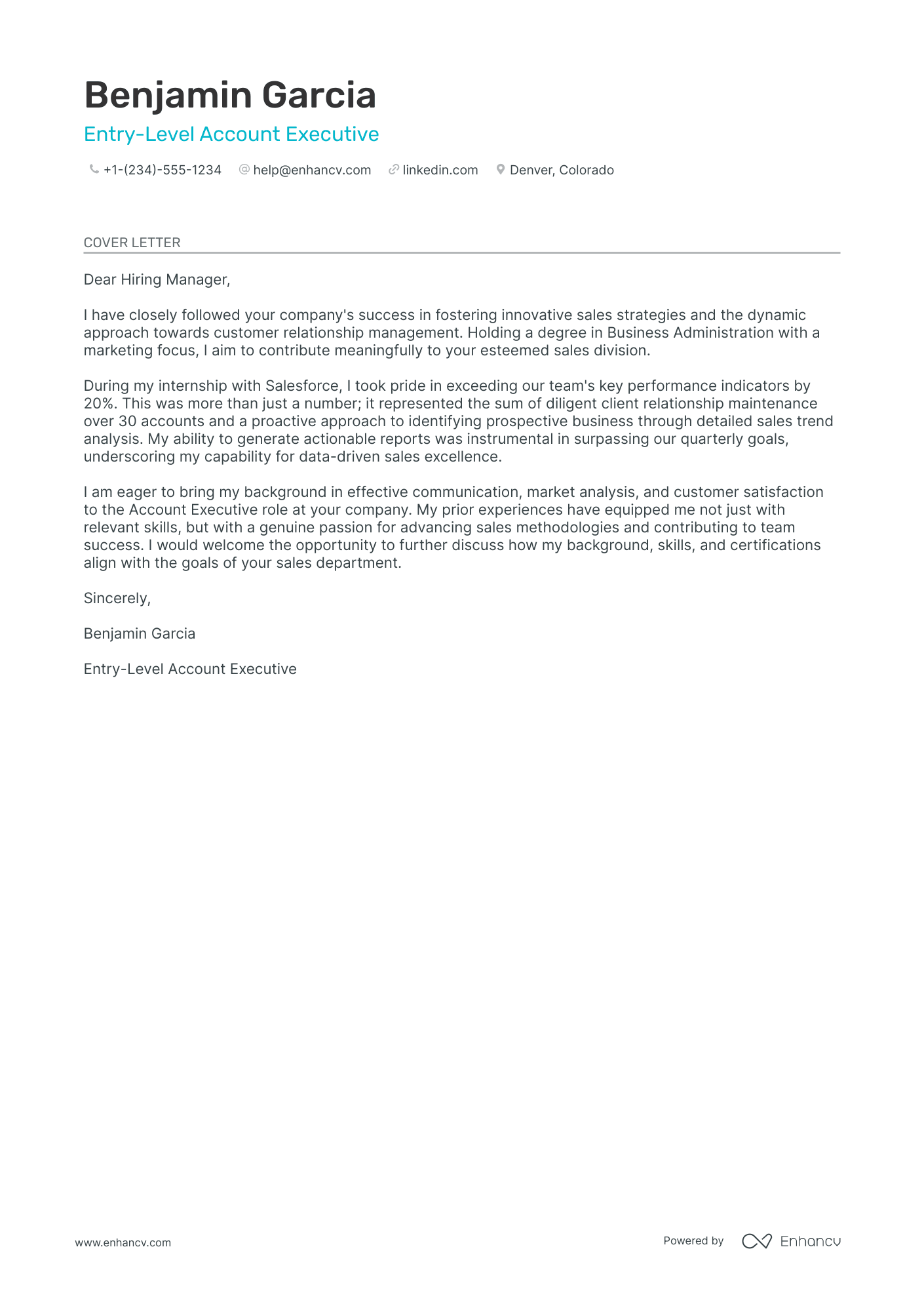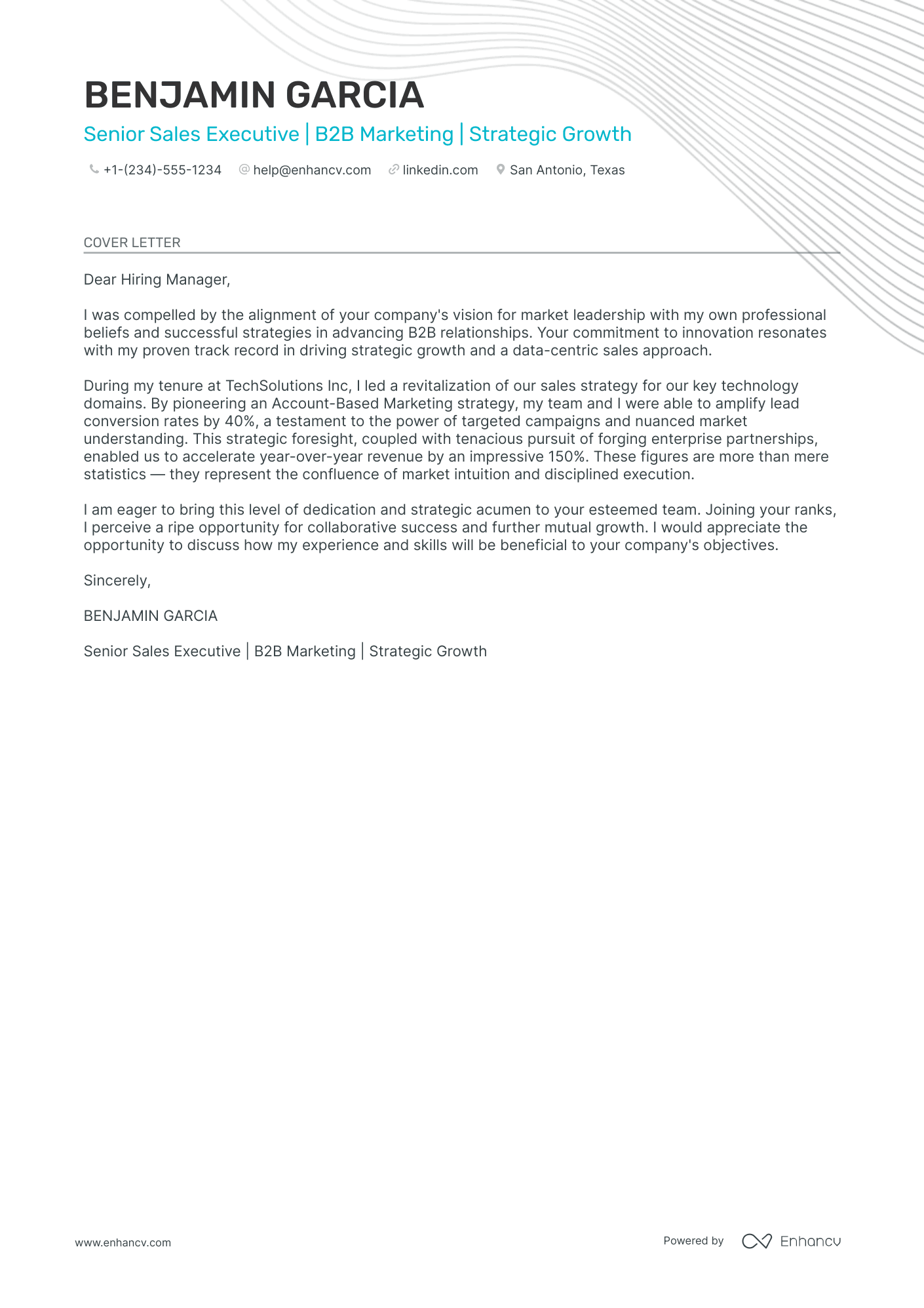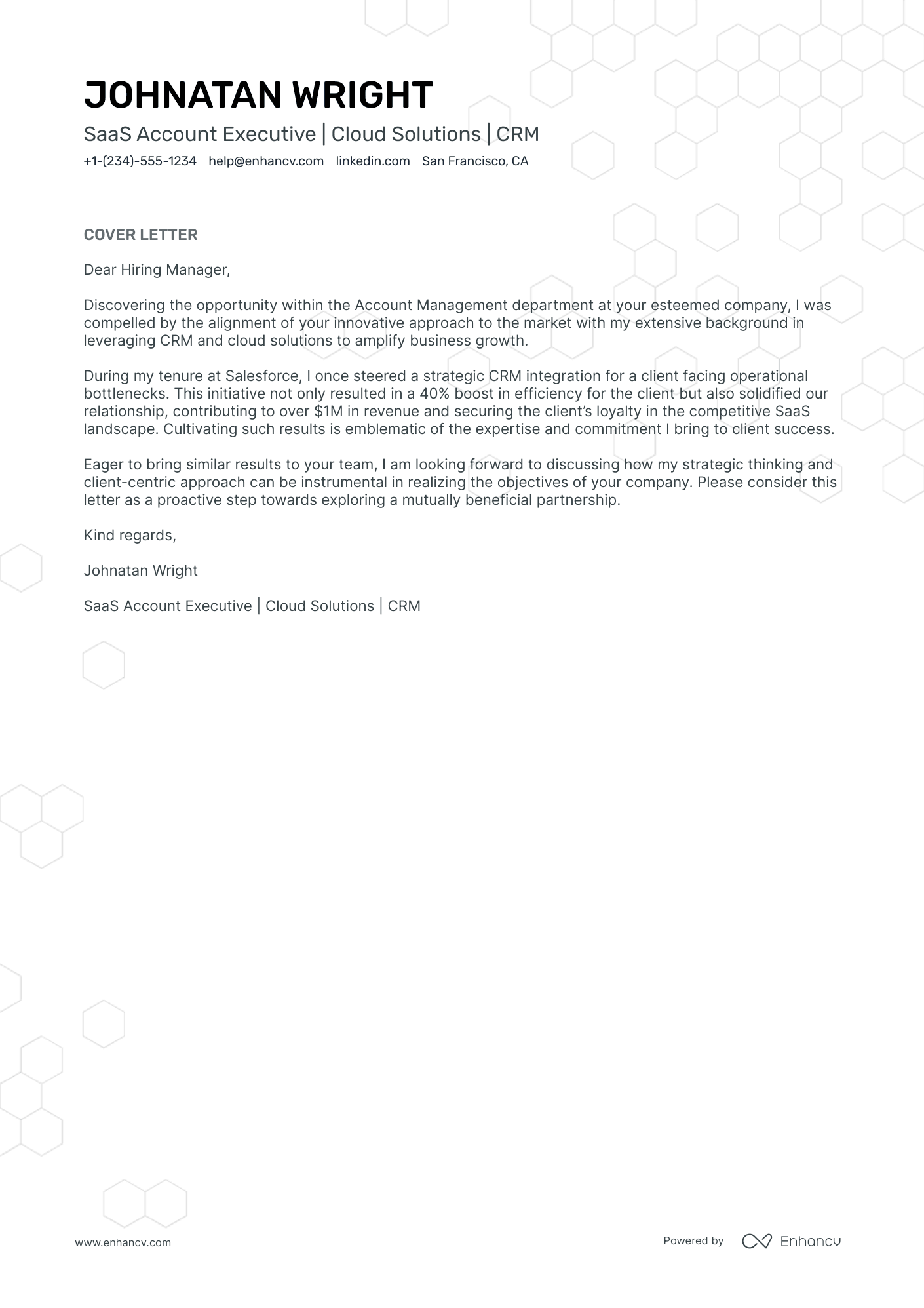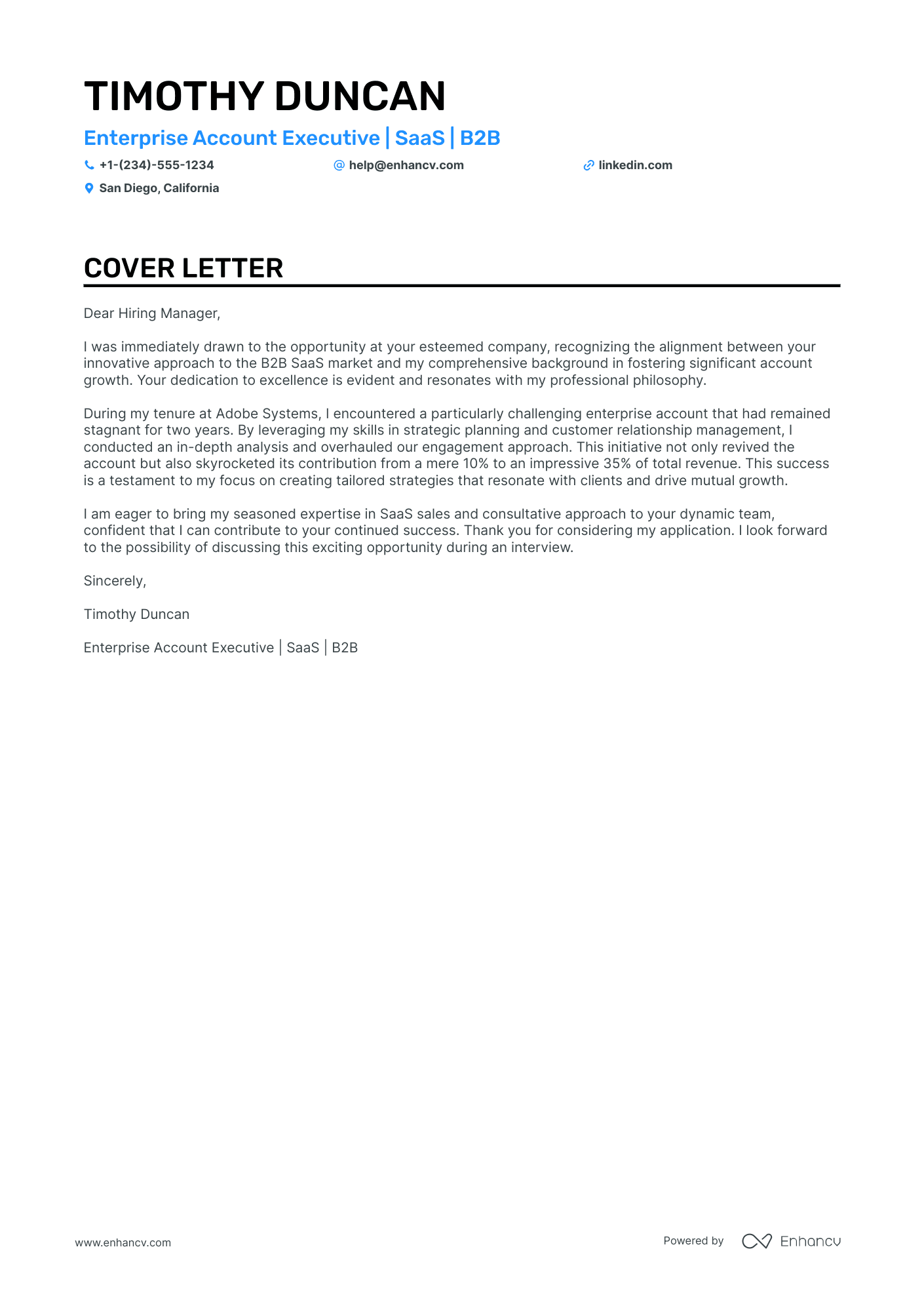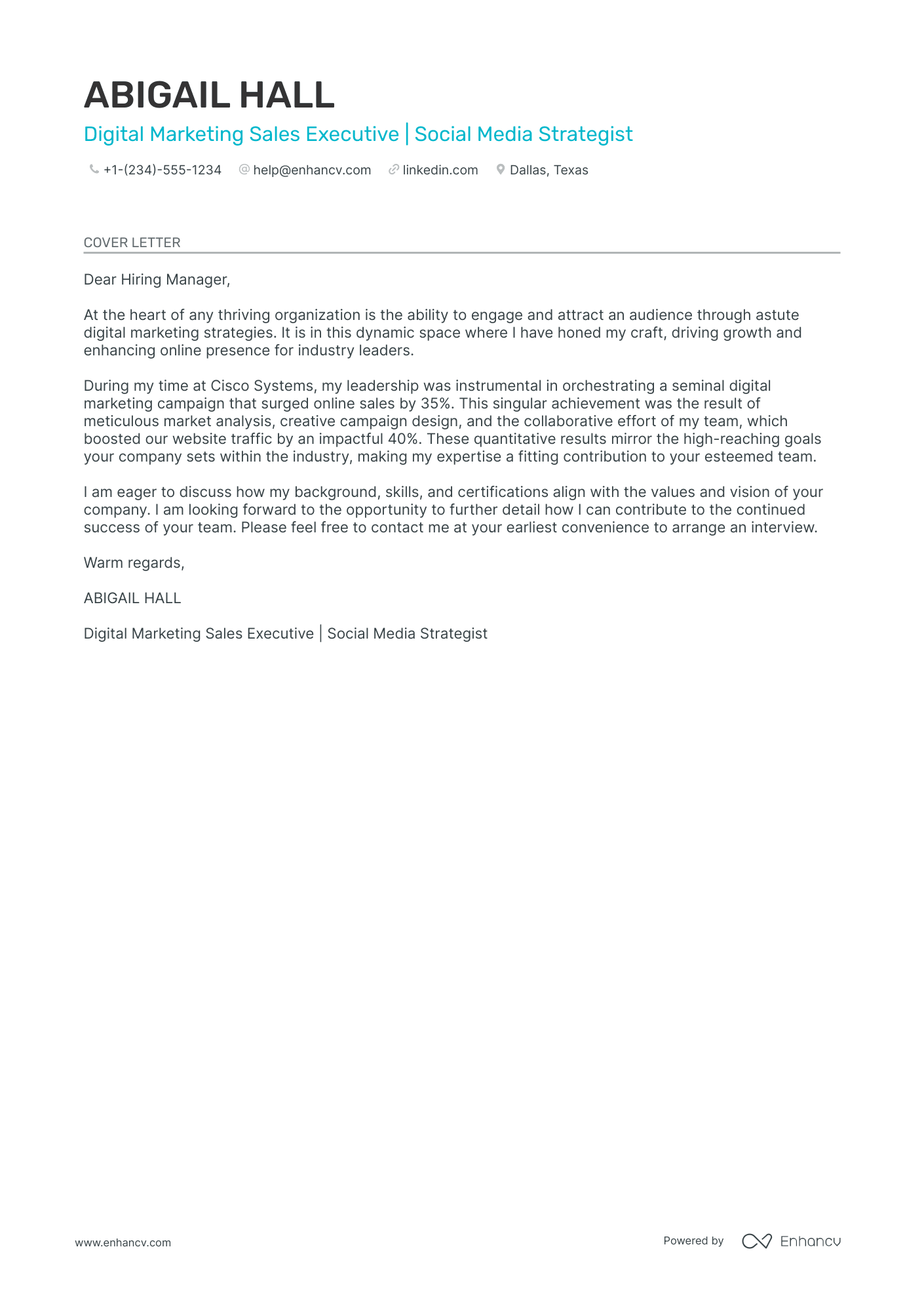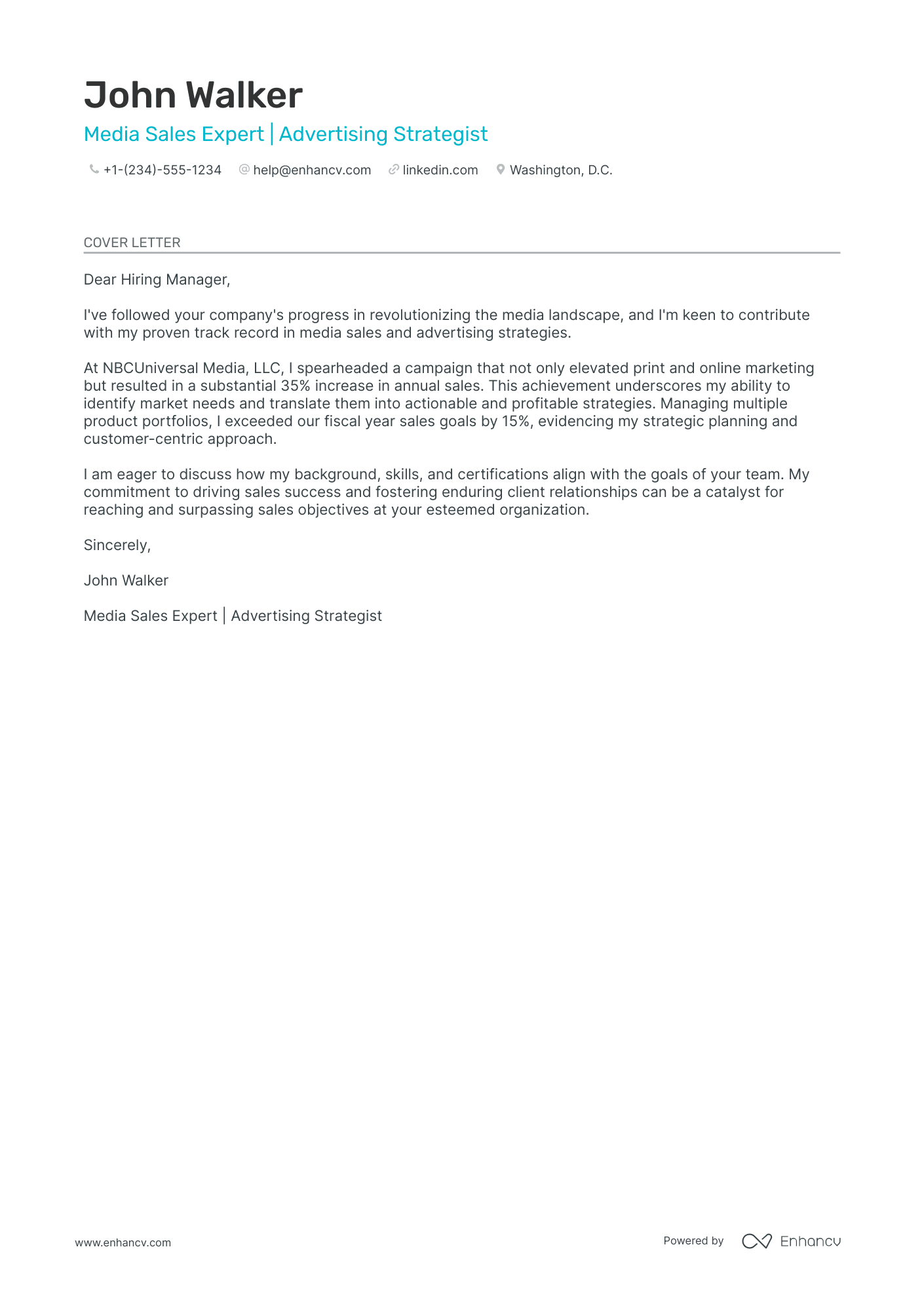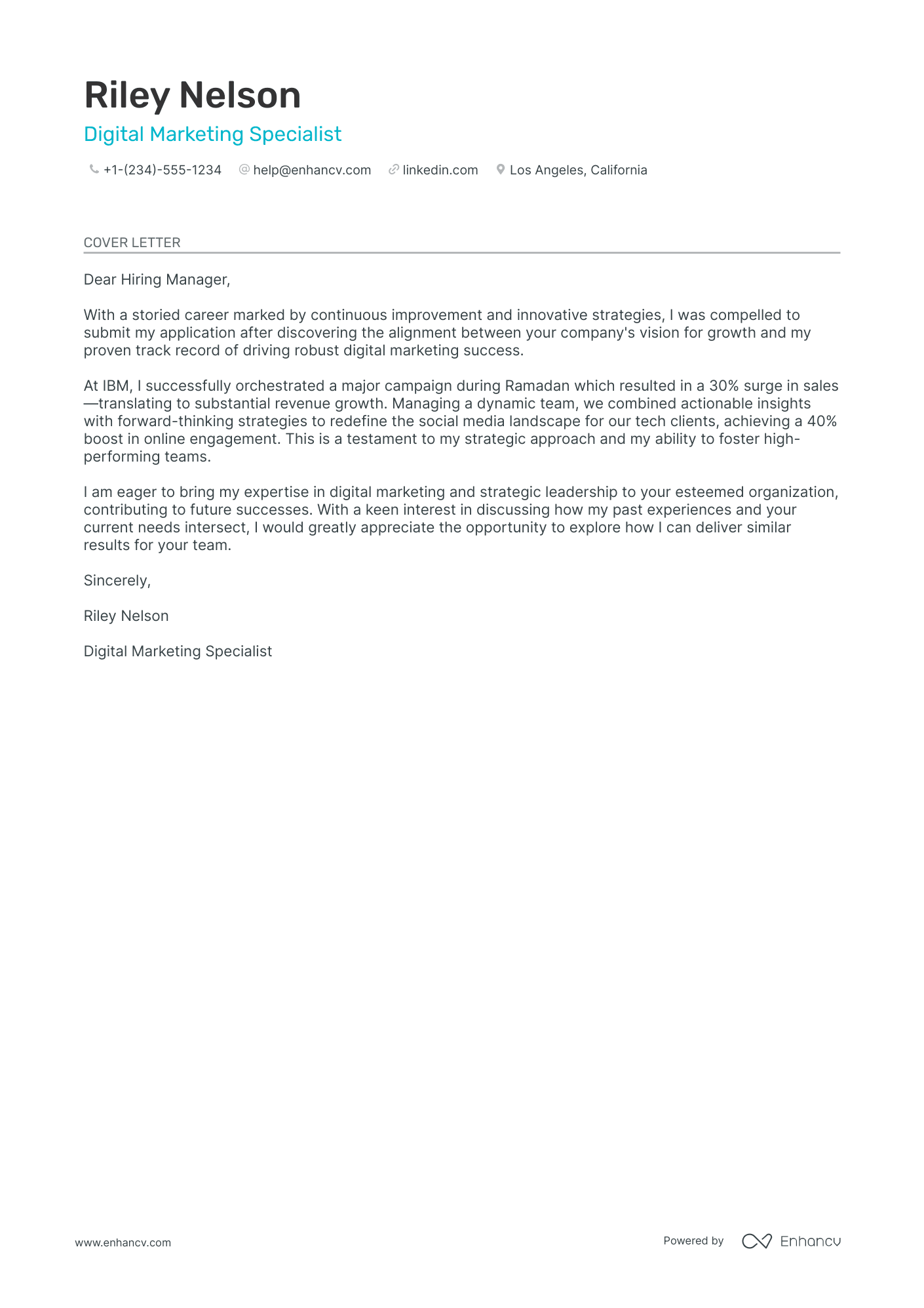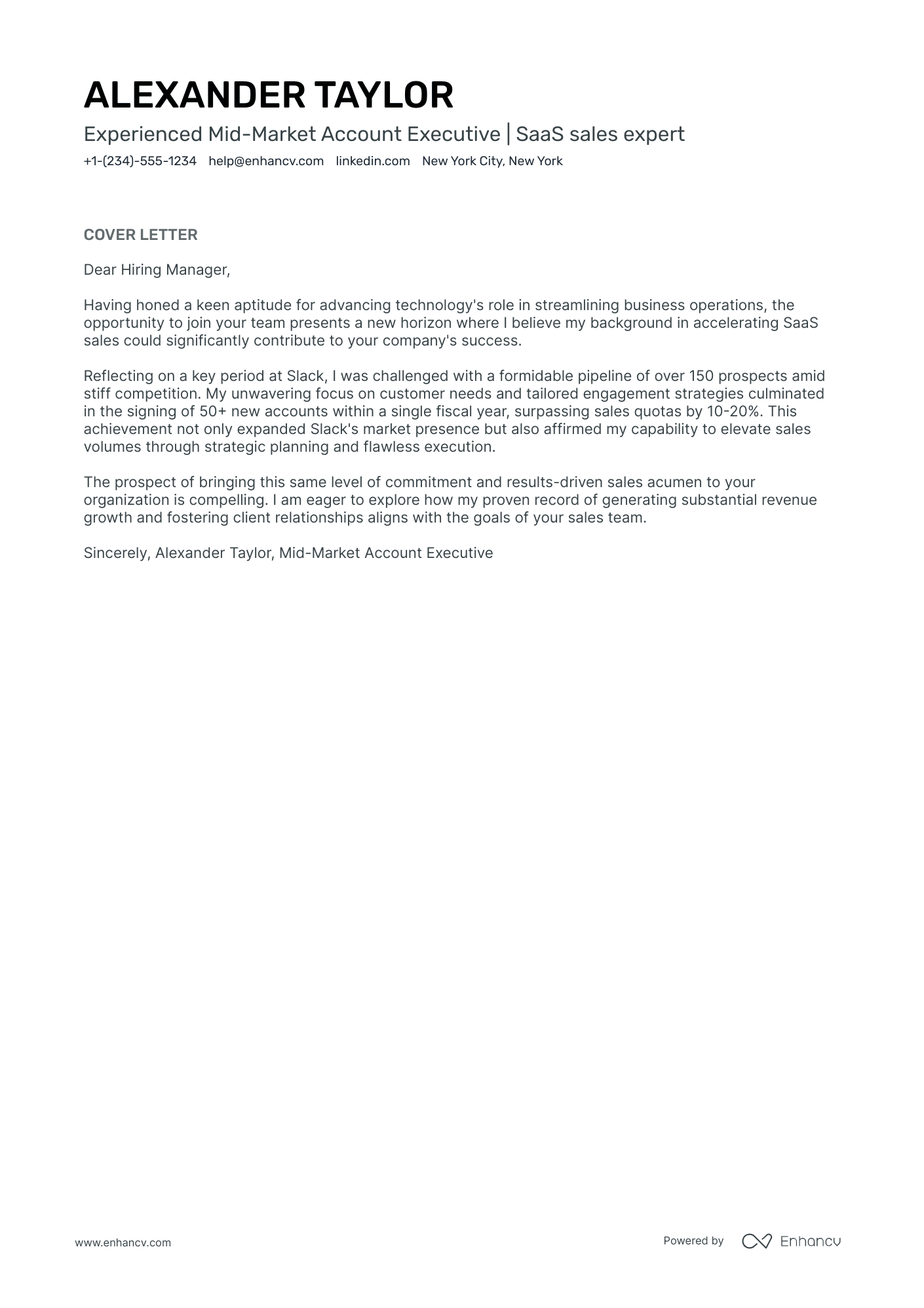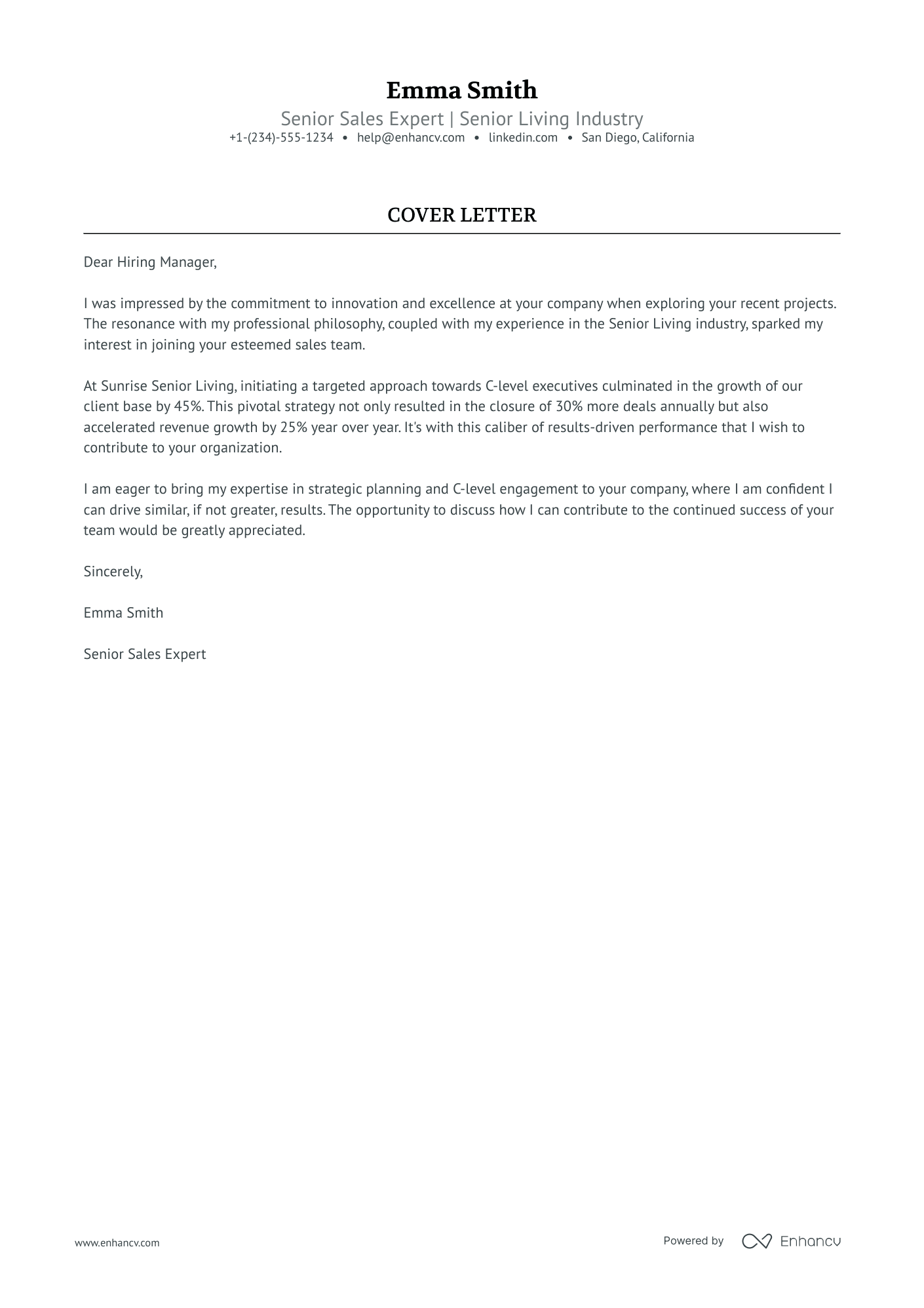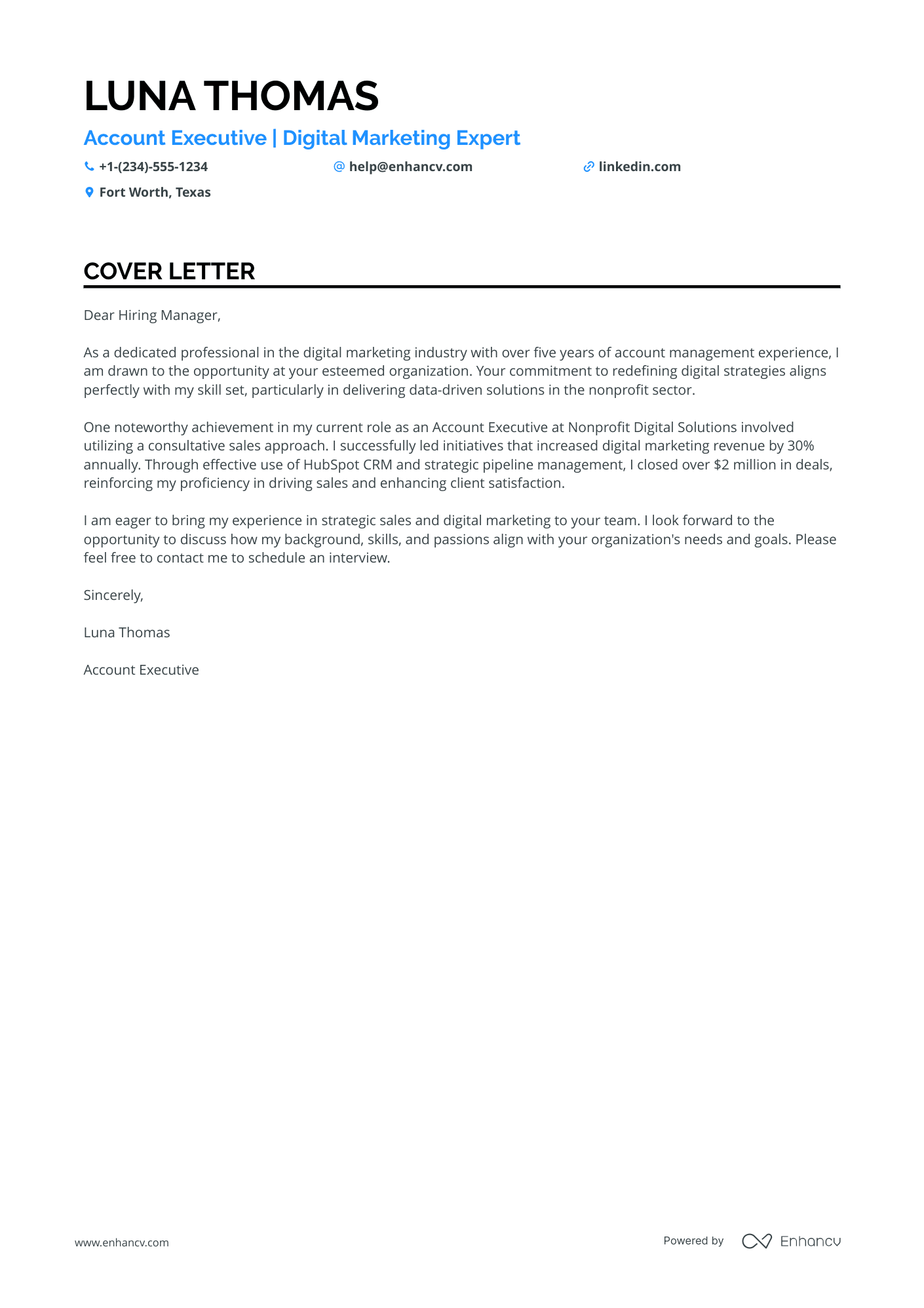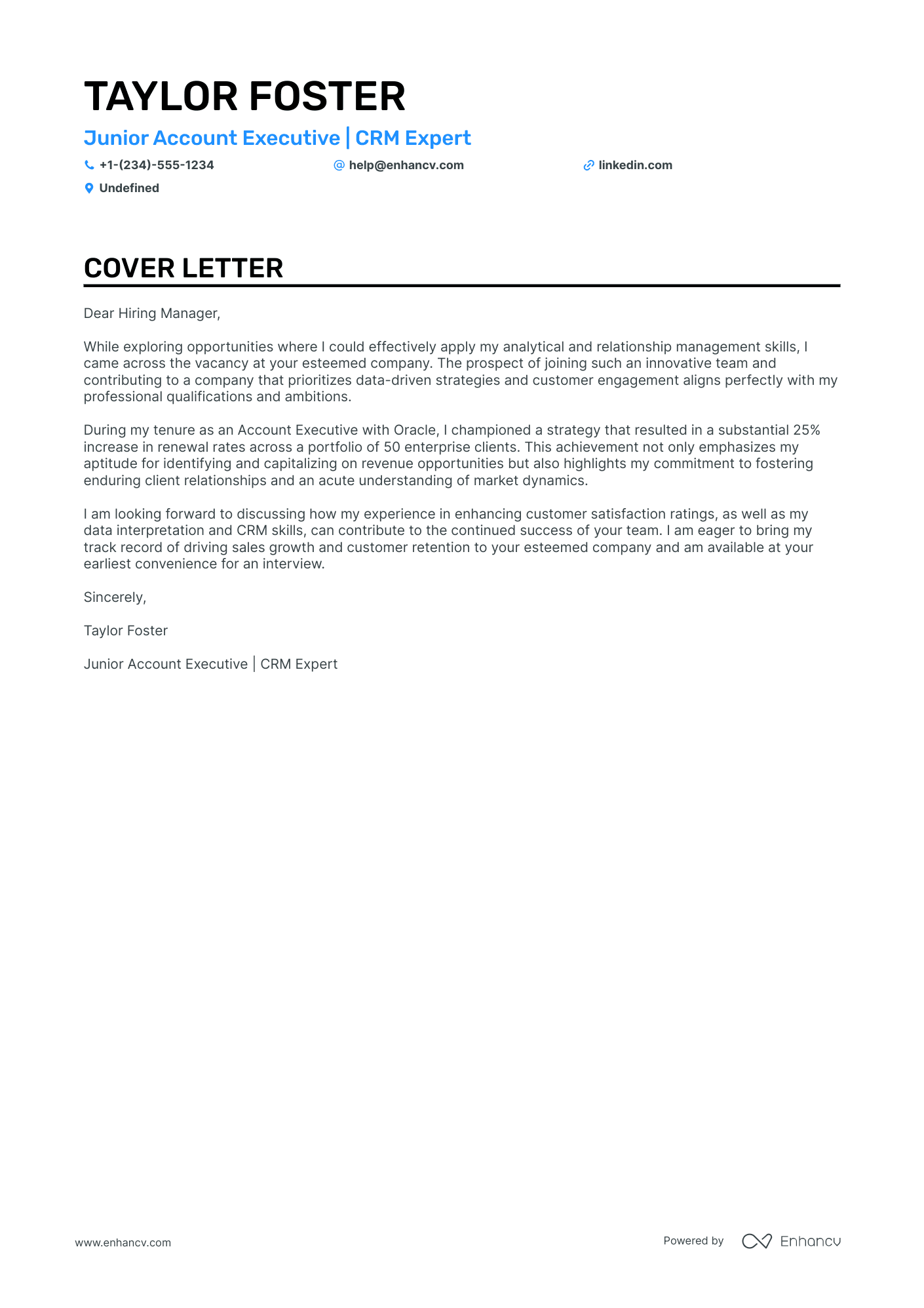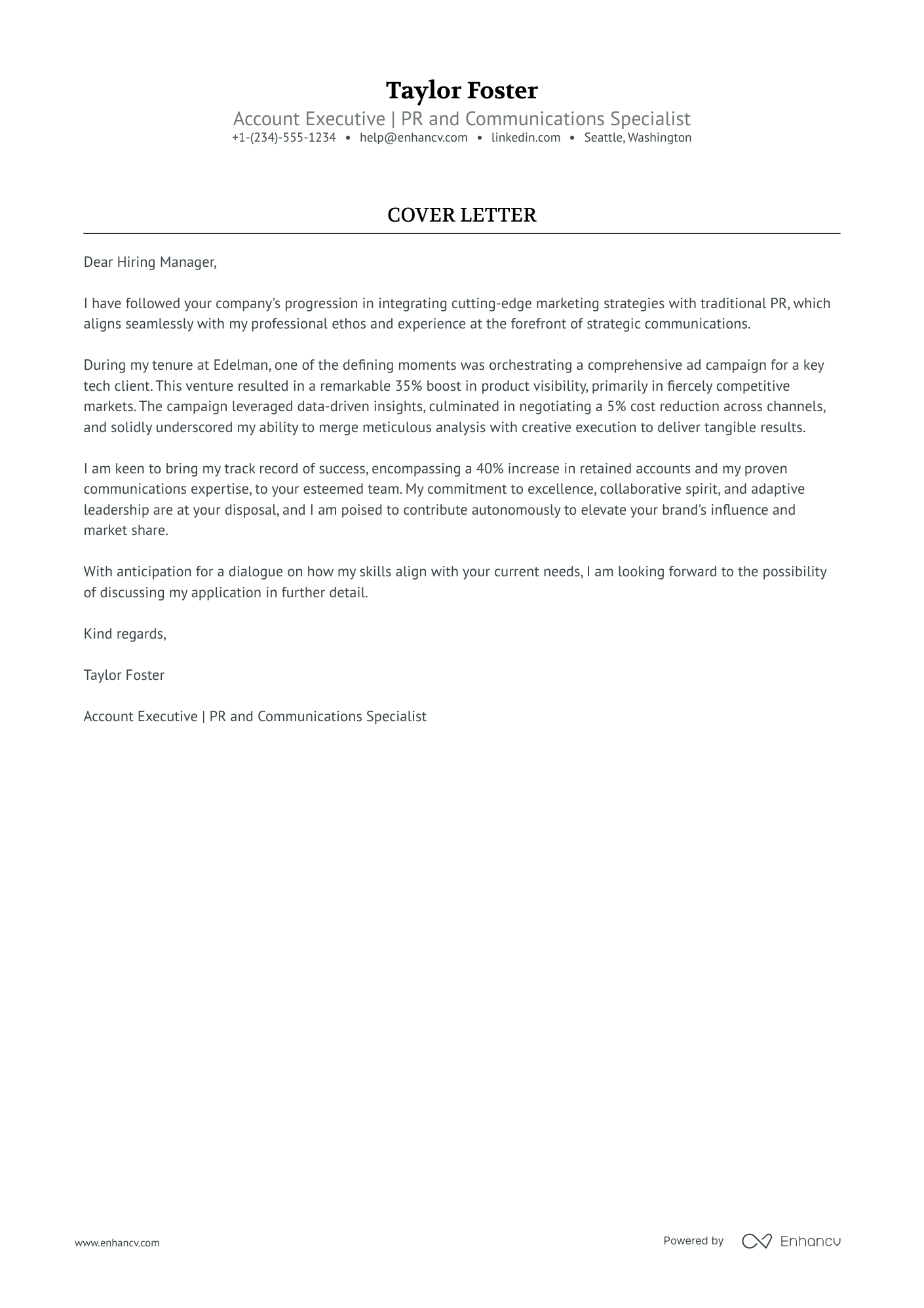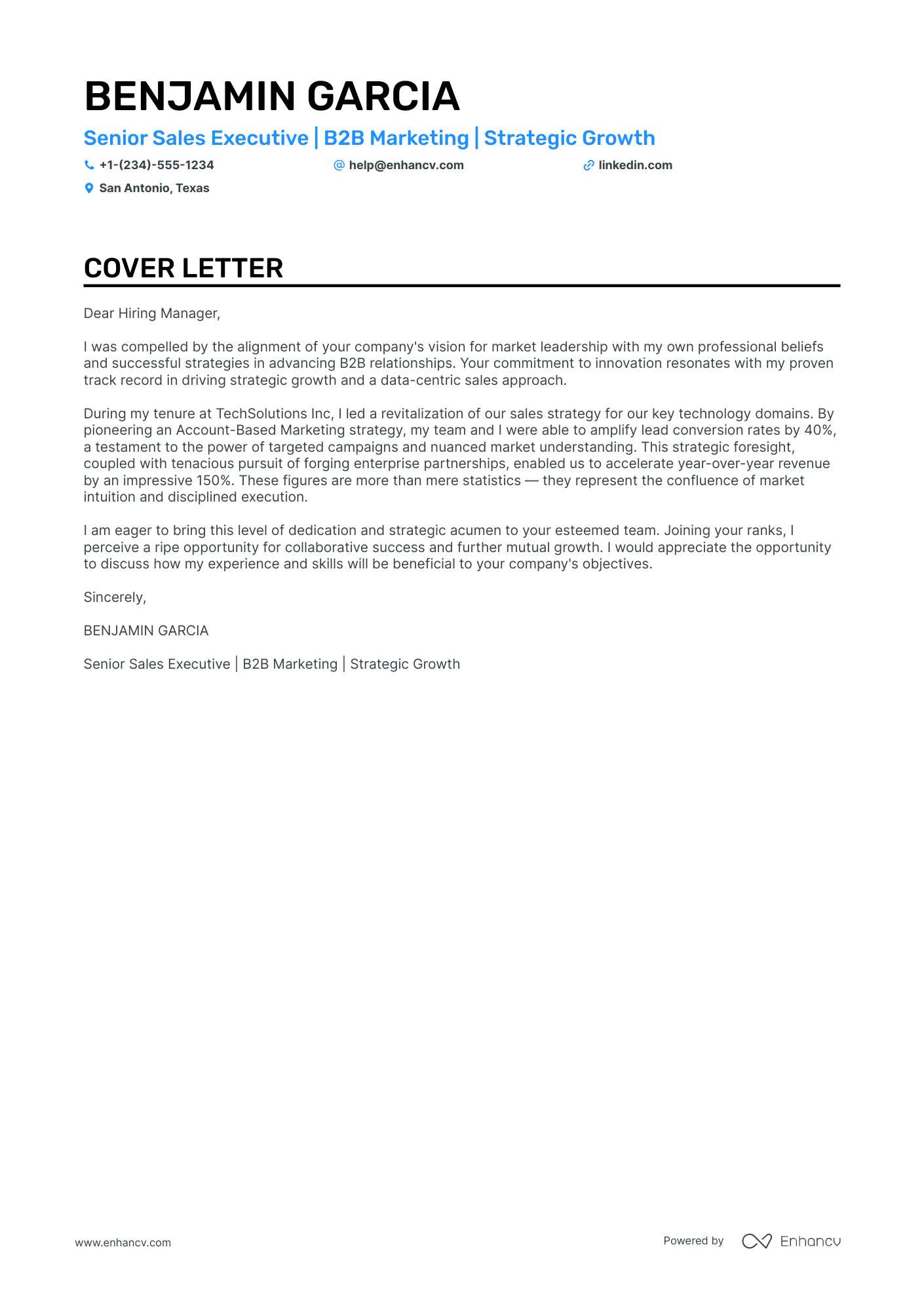Crafting an account executive cover letter can be a daunting task, especially when you've already begun your job hunt and find that a compelling letter is required. A resume lists your experiences; your cover letter should weave a narrative around your proudest professional moment without resorting to clichés. Aim for a balance of formality and personal touch in a succinct one-page story, ensuring your application stands out in a crowded field.
- Introduce your profile to catch recruiters' attention;
- Use professional templates and examples to make sure your account executive cover letter follows the best industry standards;
- Settle on your most story-worthy achievement to shine a light on what makes your application unique;
- Write a account executive cover letter, even when you lack professional experience.
Ready to start with the basics: upload your resume to Enhancv's AI, below, to see the account executive cover letter it would write for you.
If the account executive isn't exactly the one you're looking for we have a plethora of cover letter examples for jobs like this one:
- Account Executive resume guide and example
- Business Analyst Accounting cover letter example
- Banking cover letter example
- VP of Finance cover letter example
- Bank Manager cover letter example
- Assistant Finance Manager cover letter example
- Personal Banker cover letter example
- Financial Planning Analyst cover letter example
- Senior Accountant cover letter example
- Financial Auditor cover letter example
- Entry Level Financial Analyst cover letter example
Account executive cover letter example
Violet Rodriguez
Washington, D.C.
+1-(234)-555-1234
help@enhancv.com
- Quantifiable Achievements: The cover letter emphasizes the applicant's success by including specific, measurable outcomes such as contributing 120% to the sales target and generating a 25% improvement in process efficiency.
- Relevant Experience: The applicant highlights their experience in using Salesforce solutions, which is particularly relevant for companies seeking individuals with expertise in this widely used CRM platform.
- Adaptability and Innovation: The letter showcases the applicant's ability to adapt to market changes in 2020 and to innovate with a consultative approach, demonstrating an aptitude for strategic thinking and problem-solving.
- Recognition and Awards: The mention of receiving the accolade of “Top Revenue Generator of the Year” provides evidence of the applicant's exceptional performance and recognition by their peers or management.
What about your account executive cover letter format: organizing and structuring your information
Here is one secret you should know about your account executive cover letter assessment. The Applicant Tracker System (or ATS) won't analyze your cover letter.
You should thus focus on making an excellent impression on recruiters by writing consistent:
- Header
- Greeting
- Introduction
- Body paragraphs (and explanation)
- Promise or Call to action
- Signature (that's optional)
Now, let's talk about the design of your account executive cover letter.
Ensure all of your paragraphs are single-spaced and have a one-inch margins on all sides (like in our cover letter templates).
Also, our cover letter builder automatically takes care of the format and comes along with some of the most popular (and modern) fonts like Volkhov, Chivo, and Bitter.
Speaking of fonts, professionals advise you to keep your account executive cover letter and resume in the same typography and avoid the over-used Arial or Times New Roman.
When wondering whether you should submit your account executive cover letter in Doc or PDF, select the second, as PDF keeps all of your information and design consistent.
Don’t let a busy schedule hold you back. Try our free cover letter generator and build a great letter in seconds.
The top sections on a account executive cover letter
- Header: Include your full name, contact information, and date at the top of the cover letter because it's essential for a recruiter to know who you are and how to reach you for potential interviews for the Account Executive position.
- Greeting: It's important to address the cover letter to the specific hiring manager or recruiter by name whenever possible, as it shows you've done your research and are genuinely interested in the Account Executive role at their company.
- Introduction: Open with a compelling statement that highlights your enthusiasm for sales and your understanding of the Account Executive role, as this immediately draws the recruiter's attention to your relevant passion and experience.
- Body: In one to two paragraphs, detail your relevant sales achievements, key account management experience, and how your skills align with the specific requirements of the Account Executive job posting, because recruiters look for concrete examples of how you'll contribute to their team.
- Closing: Finish your cover letter with a strong closing statement that reiterates your interest in the position and your eagerness to discuss how your skills match the Account Executive role, and always include a professional sign-off with your name.
Key qualities recruiters search for in a candidate’s cover letter
- Proven sales track record: Recruiters look for a history of meeting or exceeding sales targets as it directly demonstrates the account executive's ability to generate revenue for the company.
- Relationship-building skills: The ability to create and maintain long-term relationships with clients is key to an account executive's role in ensuring customer satisfaction and loyalty.
- Communication proficiency: Excellent verbal and written communication skills are crucial for effectively conveying value propositions and negotiating deals with clients.
- Strategic thinking: An account executive needs the ability to develop and execute strategic plans to increase sales and market share, tailoring approaches to different clients and market conditions.
- Product and industry knowledge: Recruiters prioritize candidates who have a deep understanding of the products or services they will be selling, along with the industry trends and competitor activities.
- Adaptability and problem-solving: Account executives must be able to adapt to changing market conditions and client needs, as well as solve any issues that may arise during the sales process to close deals successfully.
The account executive cover letter salutation: how to address hiring managers
After covering the format of your account executive cover letter, let's look at the salutation.
Back in the day, the cordial "To whom it may concern" or "Dear Sir/Madam", might have worked out fine.
But, nowadays, your cover letter should approach hiring managers on a more personal basis.
So, what to do about your cover letter salutation?
If you've messaged the recruiters and are on a first name basis or a more formal one, use the hiring manager's name in the greeting (e.g. "Dear Sophie," "Dear Ms. Givens", or "Dear Mr. Everett,").
Always aim to make the effort to find out the name of the hiring manager, who'd be assessing your application. Search on LinkedIn, double-check the advert on the corporate website, or message the brand on social media to find out more about the role.
If you can't find the hiring manager's name (and still want to sound professional), use "Dear HR Team,", "Dear Hiring Manager,", or the likes.
List of salutations you can use
- Dear [Hiring Manager's Name],
- Dear [Mr./Ms. Last Name],
- Dear [Team/Department Name] Hiring Team,
- Dear [Mr./Ms./Dr.] [First Name] [Last Name],
- Dear [Job Title] Hiring Manager,
- Dear [Company Name] Recruiter,
Using your account executive cover letter intro to show your dedication
We know just how difficult it is to start writing your account executive cover letter introduction.
There are so many great qualities you have as a professional, which one should you choose?
How about writing up to two sentences about your passion and commitment to the work you do or are set to do?
Try to describe exactly what you enjoy about the potential role.
A positive attitude from the get-go will help you stand out as a motivated account executive professional.
Choosing your best achievement for the middle or body of your account executive cover letter
Now that you have the recruiters' attention, it's time to write the chunkiest bit of your account executive cover letter.
The body consists of three to six paragraphs that focus on one of your achievements.
Use your past success to tell a story of how you obtained your most job-crucial skills and know-how (make sure to back these up with tangible metrics).
Another excellent idea for your account executive cover letter's middle paragraphs is to shine a light on your unique professional value.
Write consistently and make sure to present information that is relevant to the role.
Ending your account executive cover letter to avoid "sincerely yours"
Yes, this sort of closing statement may work best before your signature.
But you want to give recruiters something more with your account executive cover letter ending.
Some professionals choose to go down the path of promises. In a single sentence, they map out what they'd bring about to the role (whether that's a particular technical skill set or personal traits).
Others, decide to be more concrete by thanking recruiters for their time and prompting for their next interview.
Whatever path you choose, remember to always be polite and respectful of the opportunity you've had. Good manners go a long way.
What to write on your account executive cover letter, when you have zero experience
The best advice for candidates, writing their account executive cover letters with no experience, is this - be honest.
If you have no past professional roles in your portfolio, focus recruiters' attention on your strengths - like your unique, transferrable skill set (gained as a result of your whole life), backed up by one key achievement.
Or, maybe you dream big and have huge motivation to join the company. Use your account executive cover letter to describe your career ambition - that one that keeps you up at night, dreaming about your future.
Finally, always ensure you've answered why employers should hire precisely you and how your skills would benefit their organization.
Key takeaways
We hope this account executive cover letter writing guide has shown you how to:
- Format your account executive cover letter with the mandatory sections (e.g. header, greeting, intro, body, and closing) and select the right font (P.S. It should be the same as the one you've used for your resume);
- Substitute your lack of professional experience with your most noteworthy achievement, outside of work, or your dreams and passions;
- Ensure recruiters have a more personalized experience by tailoring your cover letter not just to the role, but to them (e.g. writing their first/last name in the salutation, etc.);
- Introducing your biggest achievement and the skills it has taught you in your account executive cover letter body;
- Write no more than two sentences in your account executive cover letter introduction to set the right tone from the get-go.
Account Executive cover letter examples
By Experience
Junior Account Executive
Senior Account Executive
Entry-Level Account Executive
By Role
Account Director
SaaS Account Executive
Enterprise Account Executive
Marketing Account Executive
Account Executive Advertising
Public Relations Account Executive
Mid-Market Account Executive
Key Account Executive
Digital Marketing Account Executive
- Highlighting Relevant Achievements: The cover letter effectively showcases a significant achievement relevant to the role, such as increasing digital marketing revenue by 30% annually through a consultative sales approach.
- Mentioning Industry-Specific Tools: The applicant's proficiency with HubSpot CRM is mentioned, which is pertinent to the job and demonstrates familiarity with common industry tools.
- Demonstrating Proven Experience in Specialized Areas: Emphasizing over $2 million in closed deals illustrates the applicant's capability in high-stakes sales within the nonprofit digital marketing sector.
- Alignment with Company's Values: The candidate expresses a shared commitment to redefining digital strategies, aligning their passions with the company's mission.
